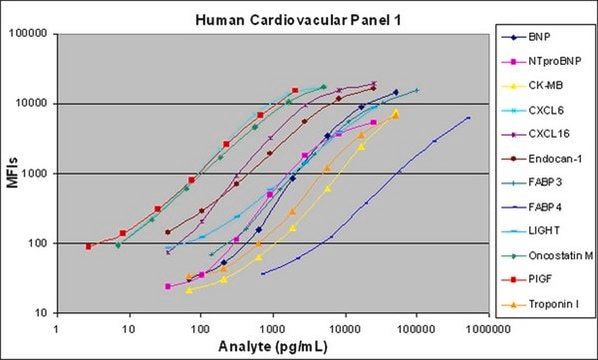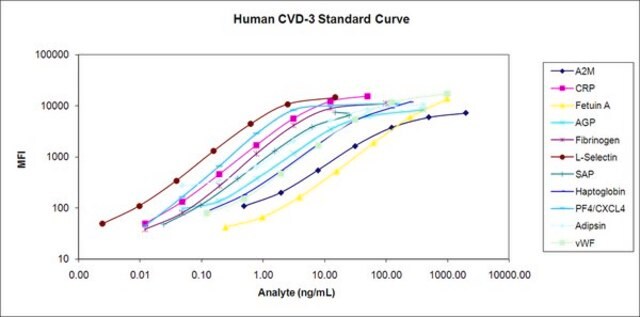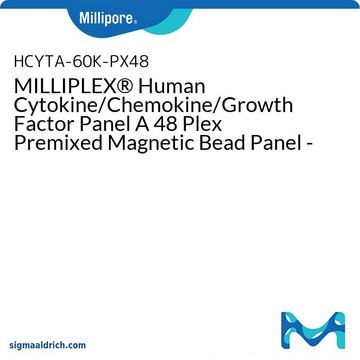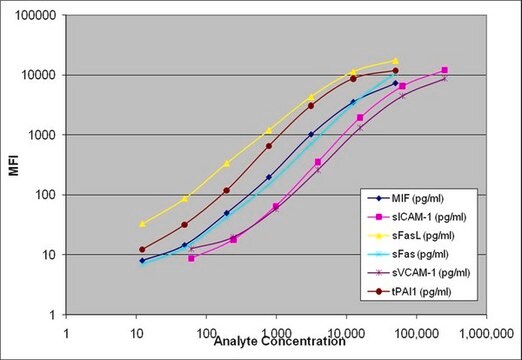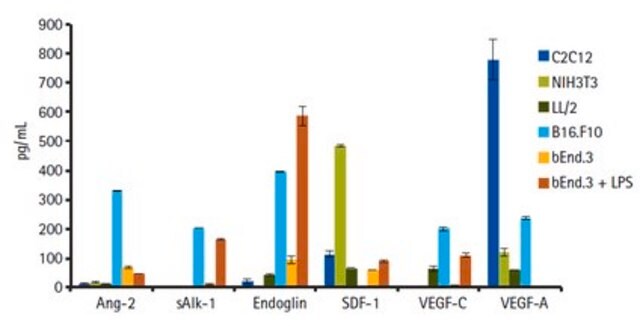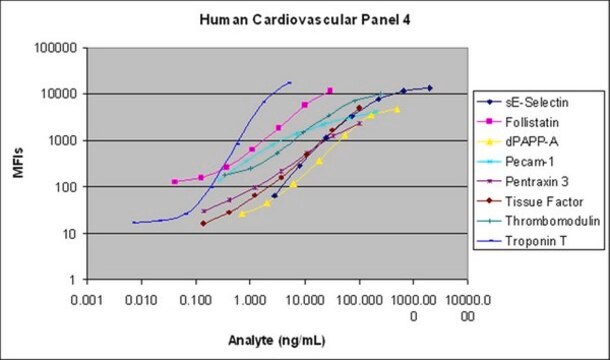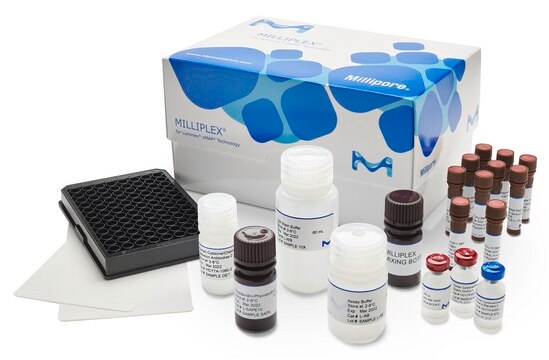HCVD2MAG-67K
MILLIPLEX® Human Cardiovascular Disease (CVD) Magnetic Bead Panel 2 - Cardiovascular Disease Multiplex Assay
The analytes available for this multiplex kit are: ADAMTS13, D-Dimer, GDF-15, Myoglobin, sICAM-1, MPO, P-selectin, Lipocalin-2/NGAL, sVCAM-1, SAA.
About This Item
Recommended Products
Quality Level
species reactivity
human
manufacturer/tradename
Milliplex®
assay range
accuracy: 88%
(Myoglobin)
accuracy: 90%
(P-selectin)
accuracy: 98%
(GDF-15)
standard curve range: 0.0005-2.5 ng/mL
(GDF-15)
standard curve range: 0.012-50 ng/mL
(Lipocalcin-2/NGAL)
standard curve range: 0.024-100 ng/mL
(Myoglobin & MPO)
standard curve range: 0.085-350 ng/mL
(sICAM-1)
standard curve range: 0.122-500 ng/mL
(sVCAM-1)
standard curve range: 0.244-1,000 ng/mL
(D-dimer, SAA & P-selectin)
standard curve range: 1.221-5,000 ng/mL
(ADAMTS 13)
inter-assay cv: <20%
intra-assay cv: <15%
technique(s)
multiplexing: suitable
detection method
fluorometric (Luminex xMAP)
shipped in
wet ice
General description
MILLIPLEX® Human Cardiovascular Disease (CVD) Panel 2 is a 10-plex kit to be used for the simultaneous quantification of any or all of the following analytes in human serum, plasma and tissue/cell lysate and culture supernatant samples: Adamts13, D-dimer, GDF-15, Myoglobin, sICAM-1, MPO, P-selectin, Lipocalin-2/NGAL, sVCAM-1 and SAA. This kit uses a 96-well format, contains a lyophilized standard cocktail, two internal assay quality controls and can measure up to 38 samples in duplicate.
The Luminex® xMAP® platform uses a magnetic bead immunoassay format for ideal speed and sensitivity to quantitate multiple analytes simultaneously, dramatically improving productivity while conserving valuable sample volume.
Panel Type: Cardiovascular
Specificity
There was no or negligible cross-reactivity between the antibodies for an analyte and any of the other analytes in this panel.
Application
- Analytes: ADAMTS13, D-Dimer, GDF15, sICAM-1, Myeloperoxidase (MPO), Myoglobin, NGAL/Lipocalin-2, sP-selectin, Serum Amyloid A (SAA), sVCAM-1
- Recommended Sample Type: Human serum, plasma, cell/tissue culture supernatants and lysates
- Recommended Sample Dilution: 25 μL per well of 1:100 diluted serum or plasma; tissue/cell culture samples may require dilution in appropriate control medium
- NOTE: D-Dimer cannot be measured in plasma samples
- Assay Run Time: Overnight (16-18 hours) at 2-8°C or 2 hours at room temperature (20-25 °C)
- Research Category: Cardiovascular Disease
- Research Subcategory: Metabolic Disorders
Features and Benefits
Other Notes
Legal Information
Disclaimer
Signal Word
Warning
Hazard Statements
Precautionary Statements
Hazard Classifications
Acute Tox. 4 Dermal - Acute Tox. 4 Inhalation - Acute Tox. 4 Oral - Aquatic Chronic 2 - Eye Irrit. 2 - Skin Irrit. 2 - Skin Sens. 1 - STOT SE 3
Target Organs
Respiratory system
Storage Class Code
10 - Combustible liquids
Certificates of Analysis (COA)
Search for Certificates of Analysis (COA) by entering the products Lot/Batch Number. Lot and Batch Numbers can be found on a product’s label following the words ‘Lot’ or ‘Batch’.
Already Own This Product?
Find documentation for the products that you have recently purchased in the Document Library.
Related Content
Learn about biomarkers of cardiovascular disease (CVD) and discover how multiplex CVD panels, such as MILLIPLEX® multiplex assays, are being used to increase the efficiency of biomarker discovery for CVD research.
Uncover tips and tricks to multiplexing in this guide from the experts. Learn how you can enhance the power of your research with MILLIPLEX® multiplexing, including industry guidance for immunoassays, multiplexing tips, one-day MILLIPLEX® multiplex assays for limited lab time, and more.
See how MILLIPLEX® multiplex immunoassays offer researchers the ability to simultaneously quantitate a large number of human cytokines, chemokines, and growth factors, and detect human immunoglobulins against SARS-CoV-2 antigens, to better understand the immune response to COVID-19, including cytokine storm.
Our team of scientists has experience in all areas of research including Life Science, Material Science, Chemical Synthesis, Chromatography, Analytical and many others.
Contact Technical Service